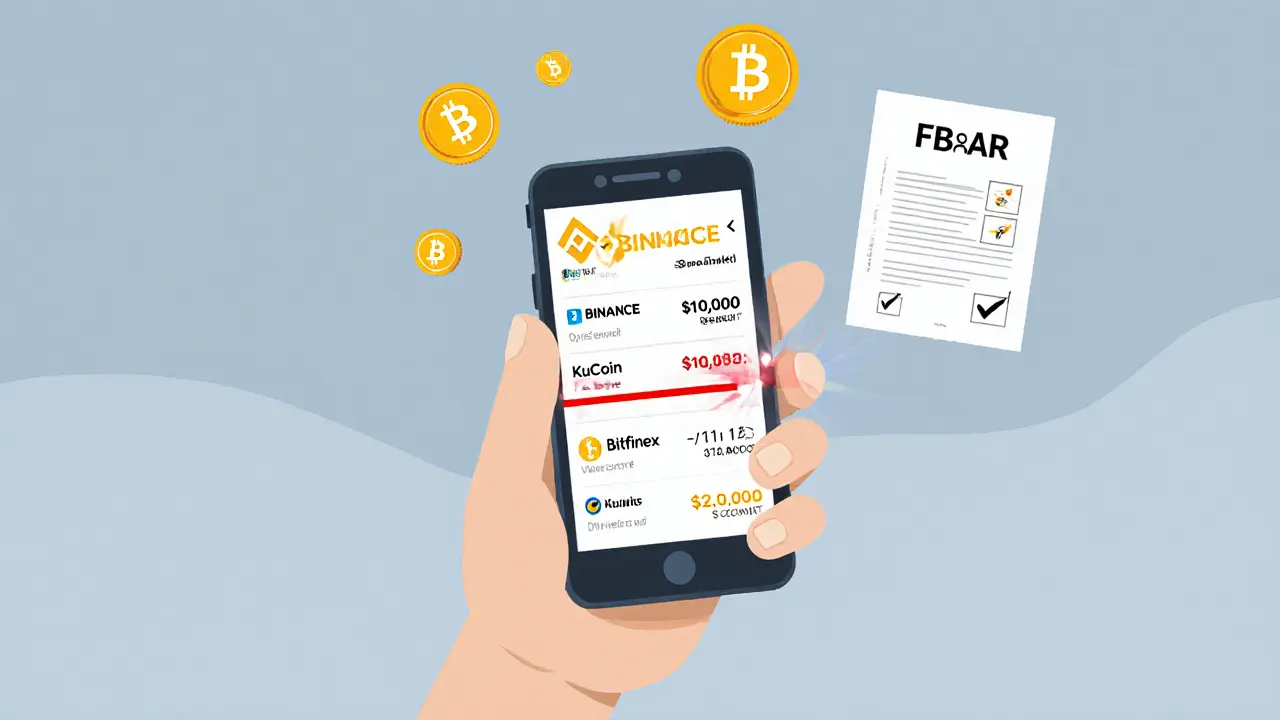FinCEN Form 114: What It Is, Who Needs It, and How Crypto Users Are Affected
When you hold cryptocurrency on a foreign exchange or wallet, you might be required to file FinCEN Form 114, a mandatory report for U.S. persons with foreign financial accounts exceeding $10,000 at any point during the year. Also known as the FBAR (Foreign Bank Account Report), this form is filed with the Financial Crimes Enforcement Network, not the IRS—but the IRS enforces it hard. If you’ve ever used Binance, Kraken, or any non-U.S. platform to trade or store Bitcoin, Ethereum, or other tokens, this form could apply to you—even if you never cashed out.
FinCEN Form 114 isn’t about taxes. It’s about transparency. The government wants to know where your money is, especially if it’s outside U.S. borders. That includes crypto held on foreign exchanges, cold wallets managed by foreign companies, or even DeFi protocols hosted overseas. If your total crypto value across all foreign accounts hit $10,000 at any time in 2024, you’re required to file. No exceptions. No "I didn’t know" defenses. The penalties for skipping this form? Up to $10,000 per violation, and if it’s deemed willful, you could owe $100,000 or half the value of your foreign accounts—whichever is higher.
Many crypto users think because they don’t sell, they don’t owe anything. That’s a dangerous myth. The IRS and FinCEN treat crypto like property, but FBAR rules treat it like cash in a Swiss bank. If you had $15,000 in ETH on Binance.com in June, and $8,000 in BTC on Kraken in December, you’ve crossed the threshold. You must report both. The form doesn’t ask for transaction history or gains—it just asks: Do you have control over foreign accounts? And is the total over $10,000? Answer yes, and you file. Answer no, and you risk being flagged for hiding assets.
What’s tricky is that not all platforms make this obvious. Some exchanges don’t tell you they’re foreign. Some wallets are hosted in offshore jurisdictions you didn’t even know about. And some users think if they use a U.S.-based app like Coinbase for trading but store their keys on a Ledger connected to a foreign node, they’re safe. They’re not. Control matters more than location. If you can move the coins, and the infrastructure is outside the U.S., FinCEN considers it a foreign account.
People in places like India, Pakistan, and Cuba use crypto to bypass local banking restrictions. But if you’re a U.S. citizen or resident living abroad—or even just traveling—you still owe this report. The same goes for Americans who moved to Thailand or Nepal and kept their crypto on local platforms. The law follows you. It doesn’t care if you’re trying to survive inflation or just want privacy. If you have foreign crypto accounts over $10,000, FinCEN Form 114 is your legal obligation.
You’ll find posts here that cover crypto regulations in Thailand, India, Pakistan, and Nepal—places where people use crypto daily, often without realizing the U.S. reporting rules still apply. You’ll also see articles on tax loopholes, airdrop scams, and exchange risks that could accidentally trigger FBAR violations. This isn’t about fear. It’s about clarity. Whether you’re holding $12,000 in SCRT on a privacy chain or $50,000 in ETH on a BSC exchange hosted in Singapore, you need to know your obligations. Below, you’ll find real-world cases, breakdowns of what counts as a foreign account, and warnings about the hidden traps that catch even experienced crypto users.
FBAR Requirements for Crypto Accounts Over $10,000 in 2025
Understand FBAR rules for cryptocurrency accounts over $10,000 in 2025. Learn when you must file, how to calculate your balance, and whether to file even if the law doesn't require it.
Details +